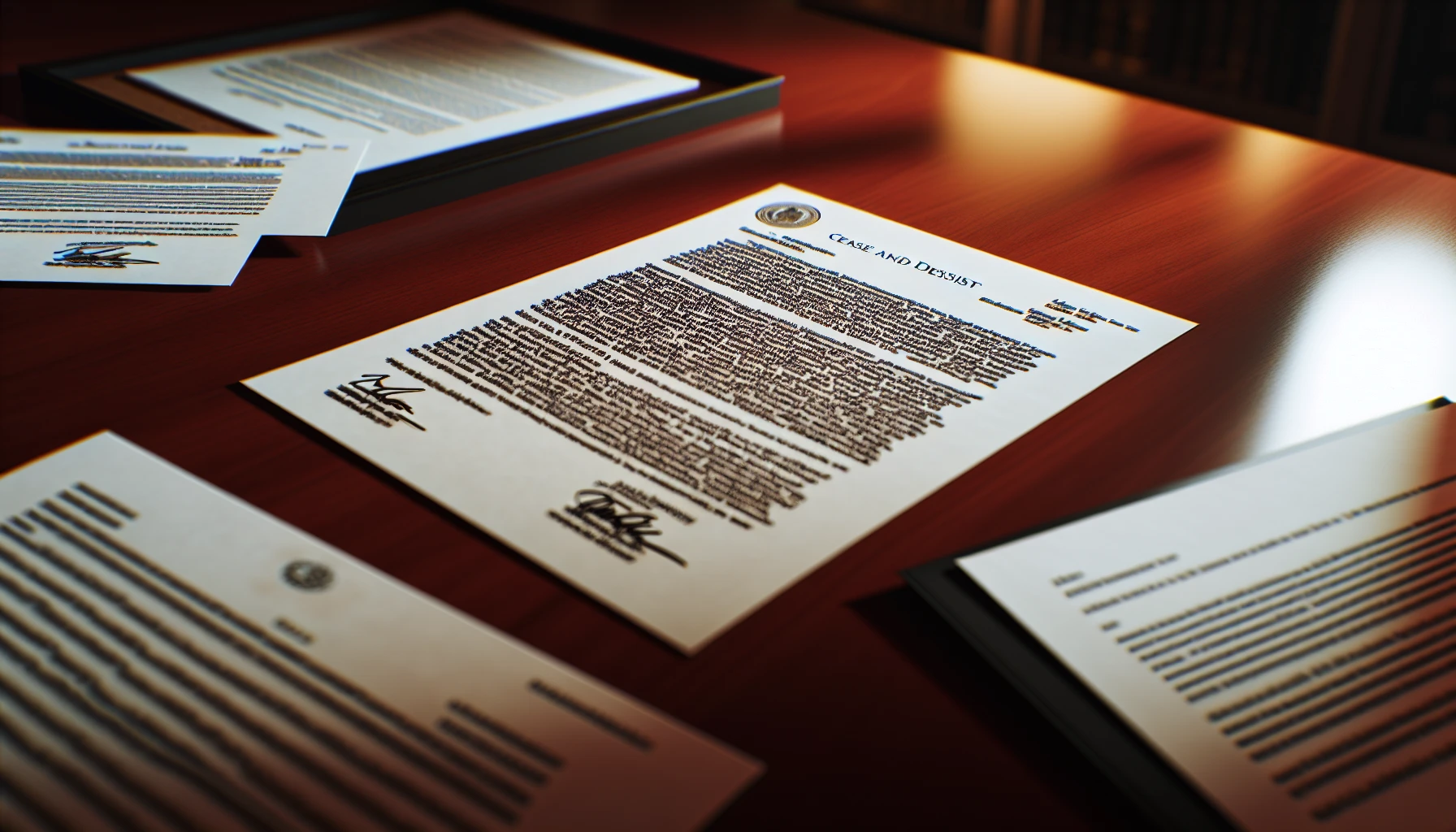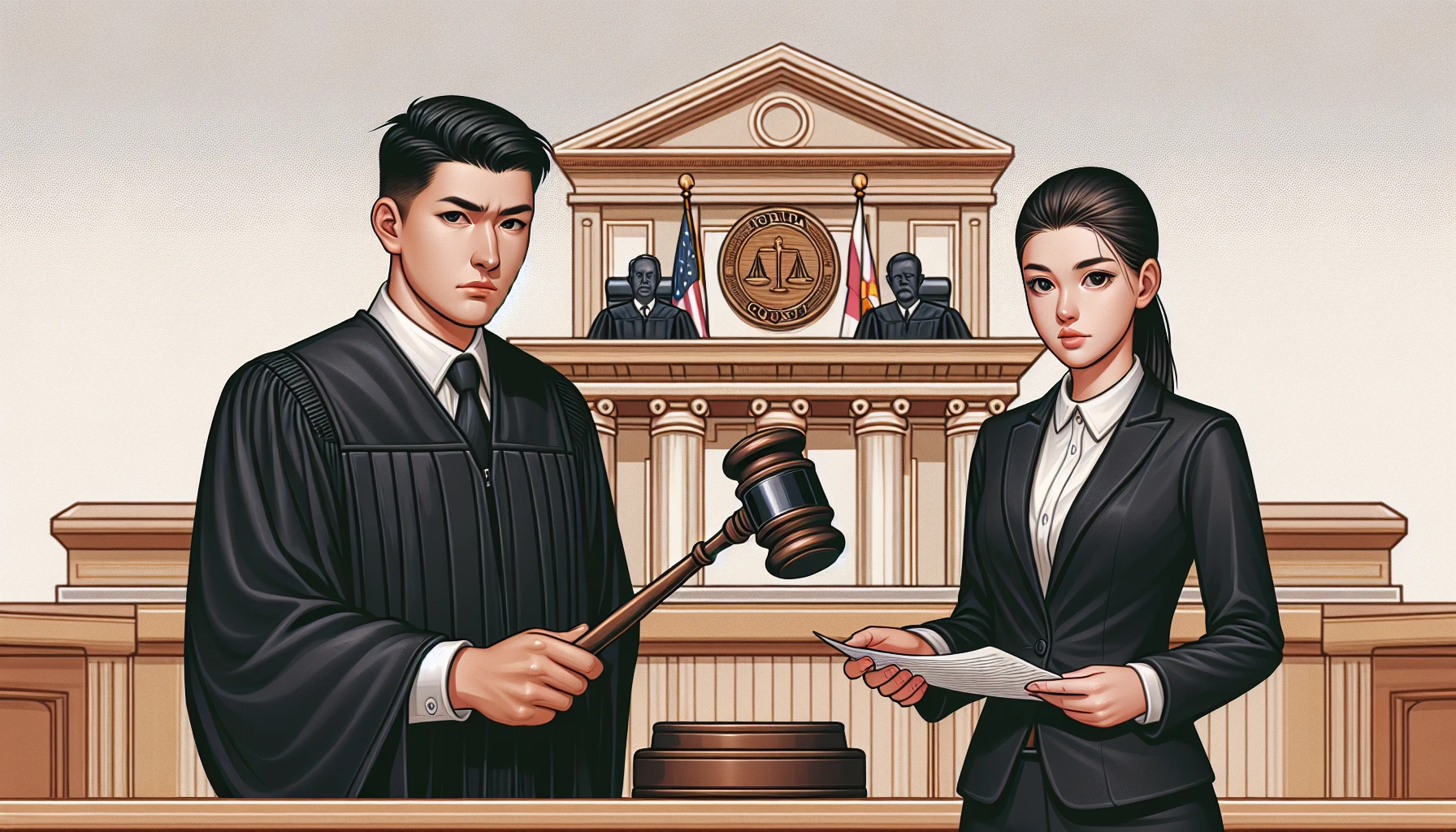Imagine a scenario where someone is infringing on your intellectual property rights, harassing you, or engaging in activities that harm your business. You’ve had enough and want to take action to protect your company and your legal rights. The solution in Florida lies in mastering the art of the cease and desist letter Florida.
Key Takeaways
- Understanding the basics of Florida cease and desist law is essential to protecting one’s legal rights.
- A clear, concise, and formal letter must be drafted with a strong legal basis for it to be effective.
- Professional advice from an attorney should always be sought when navigating complex cease and desist proceedings.
Understanding the Basics of Cease and Desist in Florida

A cease and desist letter in Florida is a powerful tool that can be used to stop unwanted behaviors or actions. It serves as a formal warning to the recipient, demanding that they cease their infringing activities or face potential legal consequences. As the office begins nonemergency cease and desist orders, it aims to shield your legal rights from further harassment or violation.
While a cease and desist notice is not a court order, ignoring it can lead to unfavorable outcomes. If the recipient fails to respond or comply, emergency cease and desist proceedings may be initiated, resulting in administrative action or even legal proceedings. Understanding the basics of cease and desist in Florida prepares you to defend your rights and interests effectively.
Crafting Your Florida Cease and Desist Letter

To create an effective cease and desist letter in Florida, certain elements must be addressed. These include using clear language to articulate your demands and establishing a solid legal basis for them. Closely focusing on these aspects increases your chances of achieving your desired outcome.
The Importance of Clear Language
The language used in your cease and desist letter plays a critical role in ensuring the recipient understands your demands and the potential consequences of non-compliance, such as facing legal action for such violation. Direct and unequivocal language can help prevent misunderstandings and encourage apprehension of legal consequences of breach. Examples include phrases such as “You must immediately desist from the purported unlawful conduct” and “Failure to comply with this letter will result in legal action being taken against you”.
Using unclear or ambiguous language can be detrimental, leading to misinterpretations and further complications, especially in cases of trademark and copyright infringement either. While Florida does not have specific legal requirements for the language used in a cease and desist letter, it is imperative to use clear, concise, and formal language to effectively express your intentions and safeguard your legal rights.
Legal Grounds for the Demand
It’s pivotal to establish a robust legal foundation for your cease and desist demand. You’ll need to reference relevant Florida state laws, such as those found in Chapter 624, Part II, Section 624.310 of the Florida Statutes. Also, it’s necessary to incorporate specific legal terms in the letter, including:
- Identification of the involved parties
- Description of the infringing activity
- Legal foundation for the demand
- Consequences of non-compliance
It’s recommended to consult a legal professional when drafting your cease and desist letter. They and attorneys can help you identify the applicable laws and ensure that all necessary legal terms and requirements are included, thereby strengthening the foundation of your demand.
Delivering Your Cease and Desist Notice: Methods and Best Practices

Once you’ve crafted your cease and desist letter, it’s time to deliver it to the recipient. In Florida, various methods and procedures can be employed for serving the letter, such as:
- Certified mail
- Fax
- Personal delivery
It may be prudent to use both email and physical letter to the offending party to ensure adequate service of the letter to such person, the other party, depending on the type of conduct and applicable legislation.
To guarantee compliance with legal requirements for serving a cease and desist letter, consider engaging the services of a professional agency to acquire evidentiary materials such as a return receipt requested. Also, seek advice from a business lawyer to receive advantageous legal counsel about the necessary steps for serving a cease and desist letter.
Taking Action Beyond the Cease and Desist Letter

If the recipient of your cease and desist letter fails to comply, it’s time to consider taking further action, such as seeking a temporary injunction or filing a civil action. Knowing when and how to intensify your legal response is key to safeguarding your interests and enforcing your rights under common law.
From Cease and Desist to Temporary Injunction
A temporary injunction is a formal order that remains in effect until a hearing is held to determine its permanence. To obtain a temporary injunction in Florida following a cease and desist letter, you’ll need to file a pleading seeking an injunction or temporary restraining order with the court. The court will then set a date for a hearing, which must take place within 15 days of filing.
At the hearing, you’ll need to present evidence supporting the need for a temporary injunction. If the judge determines that the behavior warrants a temporary injunction, they will issue the order.
The temporary injunction will remain in effect until the full hearing, which must be scheduled no later than the date when the temporary injunction ceases to be effective immediately.
When to File a Civil Action
In some cases, you may need to file a civil action after sending a cease and desist letter. This may be necessary when the recipient continues the detrimental action despite having been notified of the infringement. To transition from a cease and desist to a civil action in Florida, you’ll need to file a complaint with the court, including written agreement to the legal basis for the claim and the requested relief.
The potential outcomes of filing a civil action lawsuit after a cease and desist in Florida can vary, including resolving the dispute through negotiation or settlement, obtaining an injunction to halt the infringing activity, or pursuing damages for any harm caused. Consult with a legal professional to evaluate your specific situation and determine the best course of action.
Responding to a Cease and Desist Letter: A Guide for Recipients
If you’ve received a cease and desist letter, it’s important to consider it seriously and comprehend your options. Evaluating the claims made in the letter and formulating a response with the help of an attorney can help you navigate the situation and protect your interests.
Evaluating the Claims
To assess the validity of the claims made in the cease and desist letter, you’ll need to:
- Thoroughly review the letter and identify the nature of the claims.
- Consider the evidence and supportive documentation presented in the letter.
- Consult with legal counsel to analyze the claims and determine the appropriate course of action.
In addition to examining the claims, you should also consider the particular legal issues involved. This can be achieved by consulting the relevant law, such as underlying contracts, statutes, or other pertinent legal sources. Recognizing the legal foundation for the claims and the durability of the evidence presented in the letter is key in determining your response.
Formulating a Response
Once you’ve evaluated the claims, it’s time to craft your response to the cease and desist letter. Depending on the specific circumstances, you may choose to comply with the demands, attempt to reach a compromise, or formally dispute the claims if you deem them baseless. In all scenarios, it’s important to consult with a legal professional to guarantee that your response is well composed and includes all relevant elements.
Your response should concisely and clearly articulate your resolution to the alleged infringement of intellectual property rights. By working with an attorney, you can create a response that effectively disputes the claims or agrees to comply with the demands, depending on your assessment of the situation.
Navigating Cease and Desist Proceedings: When Legal Affairs Get Complex
As legal matters surrounding cease and desist letters can become complicated, understanding the distinction between administrative action and legal proceeding is important. Knowing how to navigate these complexities will empower you to enforce your rights and protect your interests effectively.
Understanding Administrative Action vs. Court Order
In cease and desist proceedings, the primary distinction between administrative action and litigation under a court order is the entity that issues them. Administrative action refers to actions taken by administrative bodies or agencies, such as the Securities and Exchange Commission (SEC), while a court order is a legally binding directive issued by a judge.
An administrative cease and desist order is a written document issued by a government agency that mandates a party to desist from engaging in certain activities, while a court-ordered cease and desist is a legal document issued by a judge that requires one party or the recipient to cease engaging in a certain behavior or activity without delay. Knowing the difference between these two types of cease and desist orders will help you effectively navigate the complexities of legal affairs surrounding cease and desist proceedings.
Protecting Business Interests with Professionally Drafted Cease and Desist Letters

Defending your business interests begins with seeking professional help in drafting and dispatching cease and desist letters in Florida and other law. A professionally drafted cease and desist letter can articulate your legal rights and interests, demand the recipient to cease the infringing activity, and help prevent further harm or damage.
By ensuring that your cease and desist letter is professionally drafted, you’ll not only demonstrate the seriousness of your desire to safeguard your interests but also discourage the recipient from continuing the infringing activity. Don’t hesitate to consult with a legal professional to help create a strong, effective cease and desist letter to protect your business interests in Florida.
Summary
Mastering the cease and desist letter in Florida is essential for anyone looking to protect their legal rights and interests. From understanding the basics to crafting a compelling letter, navigating complex legal affairs, and knowing when to take further action, this step-by-step guide has provided you with the tools to enforce your rights effectively. Armed with this knowledge, you’re now better equipped to stand up for yourself and your business.
Frequently Asked Questions
What is a cease and desist letter in Florida?
A cease and desist letter is a formal written request sent to an individual or organization to stop an act or activity that the sender believes is unlawful, infringing on legal rights, or causing harm in Florida.
What justifies a cease and desist letter?
A cease and desist letter is a legal document that requires the recipient to stop an illegal or allegedly illegal activity. It can be sent by someone protecting their intellectual property, real property, or business, as well as in cases of slanderous or libelous statements. It may be issued by a court or government agency, an attorney, or an individual.
Can a regular person send a cease and desist letter?
Yes, a regular person can send a cease and desist letter. These letters are not legal orders and so can be sent by anyone. However, it is recommended to seek the advice of an attorney as they will know the correct language to use.
Can a cease and desist letter backfire?
Yes, a cease and desist letter can backfire if it lacks a solid legal foundation, as the recipient will capitalize even more on the purpose of the satire or parody by waving around the ineffective letter.
What is the main purpose of a cease and desist letter in Florida?
The main purpose of a cease and desist letter in Florida is to serve a demand that the recipient cease any infringing activities, or face potential legal repercussions.


